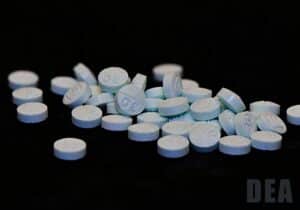Dextromethorphan, commonly known as DXM, is widely used in over-the-counter cough suppressants, available in syrups, tablets, and gel capsules. This ingredient is also often found in antihistamines and decongestants.
This article delves into the abuse of DXM, detailing common side effects and the warning signs of abuse, and discusses effective DXM treatment options for those struggling with DXM addiction. If you find yourself battling an addiction to DXM, our outpatient treatment program in Chattanooga, TN, offers the support and guidance needed to help you recover.
What is DXM?
DXM, or Dextromethorphan, is a common active ingredient in cough syrups, typically administered in doses of 15 to 30 milligrams. The maximum recommended intake within a 24-hour period is 30 milligrams. Despite this, misuse often involves consuming between 300 to 1,000 milligrams to achieve psychoactive effects ranging from mild euphoria to intense hallucinations and dissociative experiences. The effects of DXM can last from 30 minutes to five hours, during which users may experience hallucinations, paranoia, or extreme agitation. Excessive use of DXM can dangerously elevate body temperature, resembling fever symptoms. Additionally, mixing DXM with alcohol or other substances significantly heightens the risk of severe adverse reactions.
How is DXM Abused?
DXM, a cough suppressant found in gel capsules, tablets, syrups, and even powdered form for injection, is frequently misused due to its accessibility and versatility. The substance is sometimes combined with drugs like ecstasy or methamphetamine, enhancing its abuse potential. Popular among teenagers, DXM appeals due to its easy availability as an over-the-counter medication, simplicity of use, and the ability to conceal its consumption. This makes it an especially tempting option for young individuals looking to explore psychoactive experiences without the need for controlled substances.
Short And Long-Term Side Effects Of DXM Abuse
DXM abuse carries various short and long-term side effects that can impact both mental and physical health.
Short-Term Effects of DXM Abuse:
- Mild stimulation or intoxication.
- Euphoria or intense happiness.
- Inappropriate laughter.
- Paranoia and excessive wariness.
- Agitation or restlessness.
- Hallucinations, seeing or hearing things that are not present.
- Nausea and stomach discomfort.
- Altered sensory perceptions, especially hearing and touch.
- Impaired coordination, affecting movement control.
- Slurred speech, complicating clear communication.
Long-Term Effects of DXM Abuse:
- Psychological dependence on DXM.
- Cognitive impairments that disrupt thinking processes.
- Health risks like blackouts, potential heart failure, double vision, fluctuating blood pressure, skin rashes, increased heart rate, and liver damage.
These effects underscore the necessity for immediate medical intervention if experienced. Prolonged abuse of DXM poses serious health risks, and anyone suffering from these symptoms should seek urgent care from healthcare professionals or visit an emergency room to manage these critical conditions effectively.
Recognizing DXM Abuse
To identify DXM abuse in someone you care about, it’s important to observe certain behavioral and physical signs that may vary with the dosage and frequency of consumption. Signs such as paranoia, anxiety, and aggression can suggest issues with DXM abuse.
Additional signs to watch for include:
- Unusually high levels of excitement or energy.
- Difficulty with coordination and motor functions.
- Abdominal pain or discomfort.
- Uncharacteristic lethargy or fatigue.
- Profuse sweating.
- Increased blood pressure.
Being vigilant about these signs can help in early detection and intervention, which is crucial for addressing DXM addiction effectively.
What is Robotripping?
“Robotripping” is a slang term that describes the act of abusing cough syrup products containing dextromethorphan (DXM), such as Robitussin, to achieve a euphoric high. This term is derived from a common brand name and highlights the recreational use of these over-the-counter medications for their psychoactive effects. While not all teenagers who experiment with robotripping develop a dependency, habitual use can significantly harm their health or increase the risk of overdose. Teens often consume cough syrup repeatedly throughout the day to maintain their euphoria. The ready availability of cough syrup makes it difficult for many parents to detect and address their child’s misuse or potential addiction to DXM.
DXM Addiction
Addiction, known medically as substance use disorder, is a chronic but treatable condition characterized by compulsive use of substances like dextromethorphan (DXM) despite negative consequences. Not everyone who uses DXM recreationally will develop an addiction, but prolonged misuse increases the risk of developing this disorder. Diagnosis of substance use disorder is a medical process, determined by a healthcare professional based on the criteria from the Diagnostic and Statistical Manual of Mental Disorders, 5th Edition (DSM-5).
To diagnose a DXM addiction, the following criteria are considered:
- Using DXM in larger amounts or over a longer period than intended.
- Persistent desire or unsuccessful efforts to cut down or control DXM use.
- Strong craving or a strong desire to use DXM.
- Continued DXM use causing or exacerbating social or interpersonal problems.
- Ongoing use despite knowledge of persistent or recurrent physical or psychological problems likely caused by DXM.
Understanding these criteria can help identify when casual use has escalated to a level requiring professional intervention.
DXM Addiction Treatment Options
Addressing DXM addiction is essential for recovery, just as with any other substance use disorder. Despite its status as an over-the-counter medication, DXM poses serious risks, including the potential for overdose and fatal outcomes if misused continuously.
Addiction is a complex condition that impacts brain function and behavior, necessitating personalized treatment plans. Effective addiction treatment must cater to the unique needs of each individual, ensuring that the approach is tailored to their specific situation for sustained recovery.
A comprehensive treatment program does more than address substance misuse; it considers the whole person. This includes their physical, mental, and emotional health, as well as their social relationships, employment status, and any legal complications. Personalized care is crucial in addiction treatment, focusing on the varied needs of each patient to facilitate their recovery journey.
DXM Abuse Trends in Young Populations
Research by the Substance Abuse and Mental Health Services Administration (SAMHSA) indicates that DXM abuse is prevalent across different age groups but is particularly concerning among young individuals aged 12 to 26. Males, especially those over 18, are more frequently involved in DXM misuse. Historical statistics from SAMHSA have shown a troubling increase in emergency room visits related to DXM, which doubled from 2004 to 2011. Though more recent data from both the DEA and SAMHSA point to a decline in such incidents, DXM abuse continues to be a significant issue among the youth. This ongoing concern highlights the critical need for continued awareness and preventative measures to address DXM misuse effectively.
Overcome DXM Addiction at Iris Wellness Group
At Iris Wellness Group, we understand the challenges of overcoming DXM addiction and are here to help. We offer comprehensive outpatient treatment programs in Chattanooga, TN tailored to address DXM addiction specifically. To learn more about how we can support your recovery journey or that of a loved one, contact us at 423-564-6114. Begin your path to recovery and regain control with the guidance of our dedicated professionals at Iris Wellness Group.










